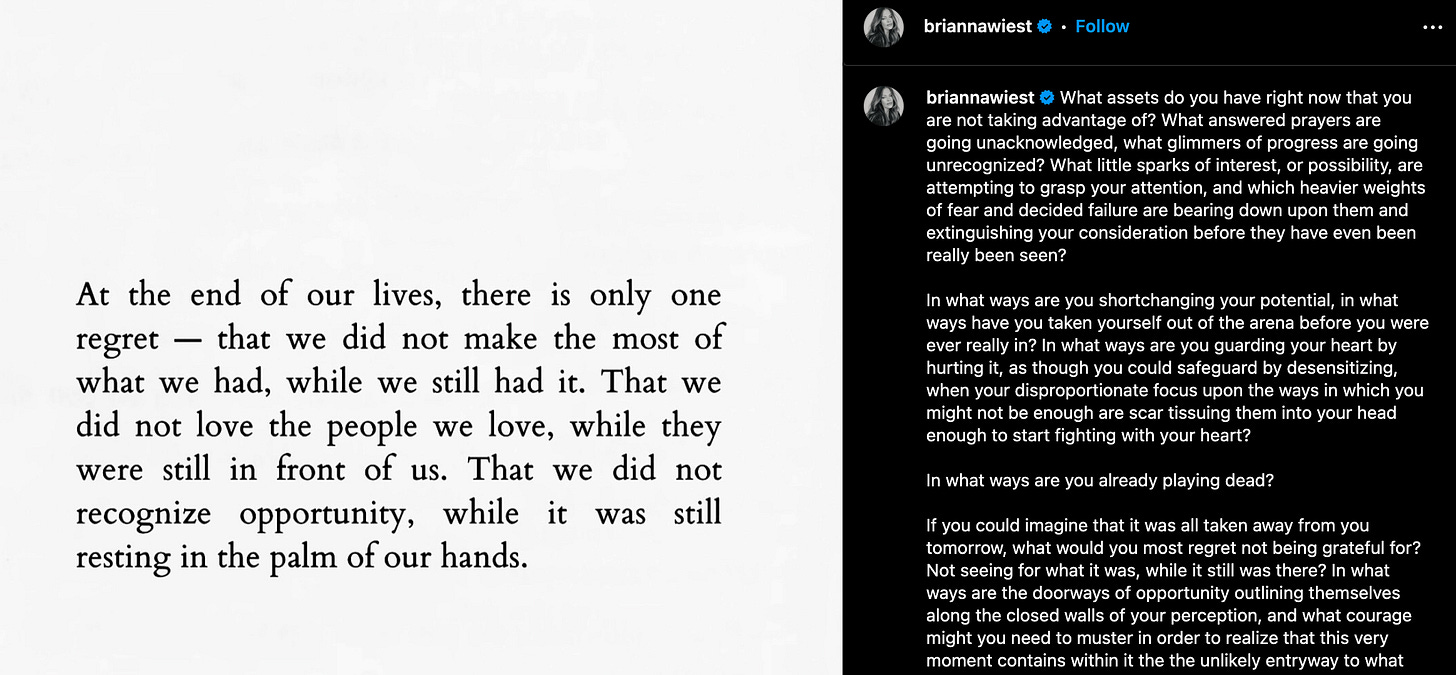Challenging assumptions: a deep dive into "The Mountain is You" by Brianna Wiest
Acknowledging my biases and seeing which of my assumptions were correct and incorrect regarding Brianna Wiest's "The Mountain is You".
CW: mental health, toxic positivity
Bias is something that I always try to be conscious of whenever I’m reading a book, self-help or not. It’s why I always dive deep into an author’s background and life experiences to try to see what might be informing their work.
However, I don’t often do a great job at holding my own biases accountable.
Whenever I read a self-help book, I always try to approach it from a place of open mindedness, because I genuinely want to try to find actual helpful self-help books to share. But, if I’m being more honest with myself, I’m always more open to certain books than I am with others. And the ones that I carry a negative bias towards when I start reading them are always books that have been at the top of bestseller lists.
This was certainly the case for “The Mountain is You” by Brianna Wiest.
I had no knowledge of the book before I picked it up and read it. All I knew is that it was popular and has been since it first came out in 2020. And for me, that was all I needed to know to assume that the book would be filled with toxic messaging and that the author would have some self-help scam business on the side.
I was wrong.
At least about some of it. Let me tell you which assumptions of mine based on my biases were right and which ones were wrong.
✅This book was going to be filled with toxic positivity
Here’s where my assumptions largely rang true, which really isn’t no surprise considering messages of toxic positivity are the staple of the self-help genre. This book was no different.
The book opens up with strong and heavy-handed messages that revolve around the idea that challenges we face in our life are just opportunities for growth. Wiest proposes that adversity is cleansing and is actually a part of nature and “When we have a problem that is chronic, we are facing the reality of ourselves.” This plays into the common narrative that the only thing holding us back in life is ourselves.
As we’ve talked about many times before, this messaging is ignorant and dangerous. Not only is it completely disregarding the systemic reasons for many of our problems (poverty, access to healthcare, racism, sexism, etc.), and instead places the blame on an individual to fix those problems. Problems that no one individual has the ability to change.
Wiest doesn’t seem to agree with this idea and instead proposes that the solution for all of our problems and for changing our lives lies within the same method proposed by Stephen Covey in his book “The 7 Habits of Highly Effective People”: just build your life off of principles and follow those principles. This type of messaging makes the idea that individuals have the power to overthrow adversity even more dangerous because it is placing a moral weight on the reason why you may or may not be able to change your life.
✅There’s probably some weird messaging around money
For me, this was the worst part of the book. Wiest echoes books such as “You Are a Badass”, “Rich Dad, Poor Dad”, and “The Secret” to not only give bad money advice, but to also try to convince the readers that rich people are good.
The primary thesis in this book is that you don’t have money because you don’t have a positive mindset about money: “Many people who struggle financially will justify their place in life by disavowing money as a whole.”
She says that people who struggle financially were taught that “all rich people are terrible” (which she says just isn’t true) and because of that they’re resisting money with this limiting belief and are going through an “adjustment shock” of resisting what you really want.
Again, I need to be honest about my own bias here: I believe that billionaires shouldn’t exist and I think that they are terrible people. The extreme wealth gap in our world is perpetrated by billionaires and corporations who only care about maintaining that wealth, even if that means that other people have literally nothing.
That being said, knowing that and then hearing that the reason why poor people are poor is because they think that these evil people are evil is infuriating to say the least. It not only places the blame on innocent people who are stuck in systems built to keep them poor, but it dissuades those people from questioning those systems. In fact, it encourages them to glorify it.
❌There’s going to be dangerous mental health rhetoric in this book
Again, I assumed that this would be the case because this is the case in most self-help books. In the beginning of the book I was worried that my assumption would be correct based off of the section regarding toxic positivity. Usually toxic positivity and lack of mental health acknowledgement go hand-in-hand.
That’s not the case in this book.
In fact, I found the sections about mental health to be educated and potentially helpful for people.
Before I continue, I should note that there were a few quotes earlier on in the book that seemed to imply that people base their identity off of their mental illness and that people with anxiety and depression can come off as irritable because they’re resistant to change. I’m still confused by this messaging as it doesn’t fit with the rest of the messaging regarding mental health in this book. It also doesn’t fit with the fact that Wiest herself has depression and anxiety. I’m not entirely sure what to make of it all, but I wanted to point it out.
That being said, a vast majority of the sections regarding mental health came from a place of compassion and understanding. Wiest encourages people to allow themselves to feel their feelings (positive or negative) and to follow those feelings:
“Mental strength is not just hoping that nothing ever goes wrong. It is believing that we have the capacity to handle it if it does.”
On top of that, she does a great job of presenting a scientifically accurate depiction of trauma and how it can impact our day-to-day lives. Oftentimes, trauma isn’t even acknowledged in self-help. She also gives some good pieces of advice on how to learn to handle and live with trauma.
Lastly, in regards to health, Weist not only doesn’t participate in the fatphobia of the self-help genre but says that your mental health is more important than whatever your weight is.
❌The book will be badly written
Here’s the best thing I can say about the book: it is genuinely very well written. This surprised me as I’m used to reading self-help books that read like they’re written by a teenager who’s desperately trying to seem cool.
But the writing in this book was clean, clear, professional, and well done overall. I would later learn after researching Wiest that her degree is in professional writing, so this isn’t actually surprising.
While I think that it’s refreshing to find a self-help book that is well written, it does make me a bit worried due to the harmful toxic messaging regarding positivity and money that I went over earlier. When something is well written, it is far more convincing to an audience and there’s far more authority behind the beliefs shared in the writing. This makes readers more susceptible into just believing what they’re told because they assume that it’s coming from a credible source. Great writing can be a powerful tool of persuasion, both for better and for worse.
❌Brianna Wiest is a scammer
This is where my bias crept in the most in regards to this book. I’m not going to lie that I automatically assume that self-help authors are scammers who are profiting heavily off of the vulnerabilities of people less privileged than them. I’ve adopted this bias due to the immense amount of data to support it. But, it’s not right all of the time and Brianna Wiest is a great example.
When I tell you I scoured the internet looking for any evidence of a privileged upbringing (beyond the obvious privilege of being white) , of current wealth, or of toxic messaging on social media, I mean I scoured it.
But I couldn’t find a single thing about Brianna Wiest that would make her a scammer in any way. In fact, I found that I had more in common with Wiest than anything else.
Like me, Wiest started writing to help with her mental illnesses that she was diagnosed with in her early teens (anxiety, OCD, and depression). Like me she was an editor at her university’s newspaper. Like me, she has a degree in professional writing (mine’s in English, but that’s close enough). Like me, her first published book was a book of poetry.
Do you remember the platform Thought Catalog that was one of the biggest publishers of think pieces and articles back in the 2010’s? It was my biggest dream after I graduated college to be featured on their website. I can’t tell you how many times I’ve submitted articles there. But unlike me, Weist actually managed to get published there and was a massive contributor to the site.
In fact, she still posts there and has an entire web shop there of various pieces of merch ranging from notebooks to sweaters. And to be honest? Not bad as far as merch goes. And guess what? No courses, no coaching, no scam products.
And sure, she does post inspirational quotes on her Instagram that are sometimes a bit cringey in regards to toxic positivity (like mentioned in the book), but there’s nothing outwardly egregious about anything she posts.
But at the end of the day, I couldn’t find anything about her that raises alarm bells. Because of that, I couldn’t help but wonder where and why she started believing the harmful ideas surrounding positivity and money that she spread throughout this book. I couldn’t find any evidence in her actual life that would lead me to believe that she has any personal skin in the game to try to convince people to blame themselves and to stop demonizing rich people.
To me, this leaves only one possibility: that she herself has fallen in the trap of self-help (again, like her, I’ve been there) when it comes to the reason why she’s spreading harmful messages regarding positivity and money. A lot of the messaging that she shares about those topics is regurgitated messages that are popular throughout the genre of self-help. They may be messages that she has internalized without critically thinking about them in a wider scope beyond the self.
All I can hope for is that you start to do this. Start thinking critically about the messages shared in the self-help industry and what implications they hold once we start thinking beyond just ourselves.





